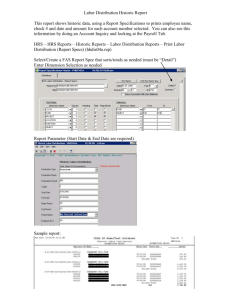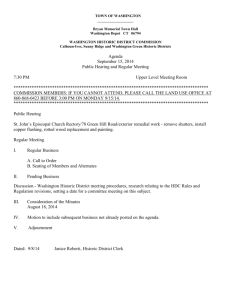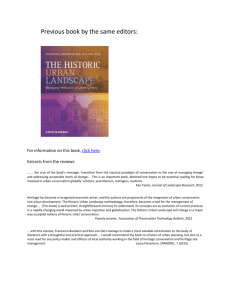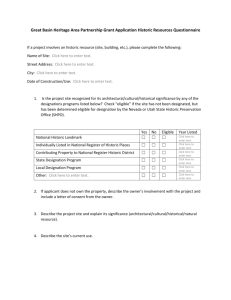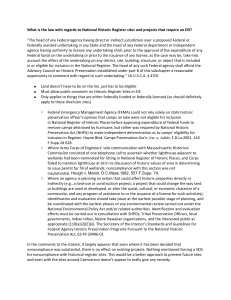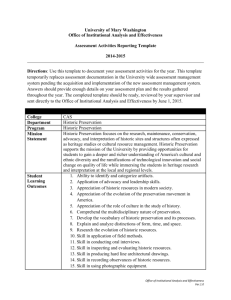National Historic Preservation Act of 1966,
advertisement
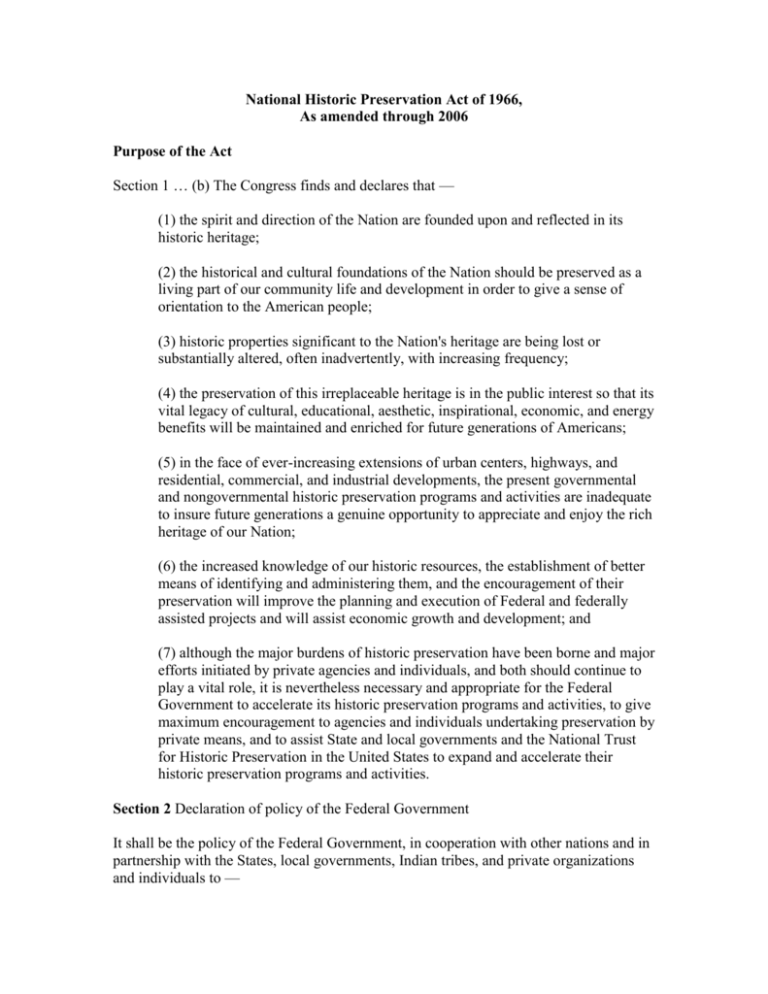
National Historic Preservation Act of 1966, As amended through 2006 Purpose of the Act Section 1 … (b) The Congress finds and declares that — (1) the spirit and direction of the Nation are founded upon and reflected in its historic heritage; (2) the historical and cultural foundations of the Nation should be preserved as a living part of our community life and development in order to give a sense of orientation to the American people; (3) historic properties significant to the Nation's heritage are being lost or substantially altered, often inadvertently, with increasing frequency; (4) the preservation of this irreplaceable heritage is in the public interest so that its vital legacy of cultural, educational, aesthetic, inspirational, economic, and energy benefits will be maintained and enriched for future generations of Americans; (5) in the face of ever-increasing extensions of urban centers, highways, and residential, commercial, and industrial developments, the present governmental and nongovernmental historic preservation programs and activities are inadequate to insure future generations a genuine opportunity to appreciate and enjoy the rich heritage of our Nation; (6) the increased knowledge of our historic resources, the establishment of better means of identifying and administering them, and the encouragement of their preservation will improve the planning and execution of Federal and federally assisted projects and will assist economic growth and development; and (7) although the major burdens of historic preservation have been borne and major efforts initiated by private agencies and individuals, and both should continue to play a vital role, it is nevertheless necessary and appropriate for the Federal Government to accelerate its historic preservation programs and activities, to give maximum encouragement to agencies and individuals undertaking preservation by private means, and to assist State and local governments and the National Trust for Historic Preservation in the United States to expand and accelerate their historic preservation programs and activities. Section 2 Declaration of policy of the Federal Government It shall be the policy of the Federal Government, in cooperation with other nations and in partnership with the States, local governments, Indian tribes, and private organizations and individuals to — (1) use measures, including financial and technical assistance, to foster conditions under which our modern society and our prehistoric and historic resources can exist in productive harmony and fulfill the social, economic, and other requirements of present and future generations; (2) provide leadership in the preservation of the prehistoric and historic resources of the United States and of the international community of nations and in the administration of the national preservation program in partnership with States, Indian tribes, Native Hawaiians, and local governments; (3) administer federally owned, administered, or controlled prehistoric and historic resources in a spirit of stewardship for the inspiration and benefit of present and future generations; (4) contribute to the preservation of nonfederally owned prehistoric and historic resources and give maximum encouragement to organizations and individuals undertaking preservation by private means; (5) encourage the public and private preservation and utilization of all usable elements of the Nation's historic built environment; and (6) assist State and local governments, Indian tribes and Native Hawaiian organizations and the National Trust for Historic Preservation in the United States to expand and accelerate their historic preservation programs and activities. Section 101 (a) (1) (A) The Secretary of the Interior is authorized to expand and maintain a National Register of Historic Places composed of districts, sites, buildings, structures, and objects significant in American history, architecture, archaeology, engineering, and culture. … … (6) The Secretary shall promulgate regulations requiring that before any property or district may be included on the National Register or designated as a National Historic Landmark, the owner or owners of such property, or a majority of the owners of the properties within the district in the case of an historic district, shall be given the opportunity (including a reasonable period of time) to concur in, or object to, the nomination of the property or district for such inclusion or designation. If the owner or owners of any privately owned property, or a majority of the owners of such properties within the district in the case of an historic district, object to such inclusion or designation, such property shall not be included on the National Register or designated as a National Historic Landmark until such objection is withdrawn. The Secretary shall review the nomination of the property or district where any such objection has been made and shall determine whether or not the property or district is eligible for such inclusion or designation, and if the Secretary determines that such property or district is eligible for such inclusion or designation, he shall inform the Advisory Council on Historic Preservation, the appropriate State Historic Preservation Officer, the appropriate chief elected local official and the owner or owners of such property, of his determination. … Section 106 The head of any Federal agency having direct or indirect jurisdiction over a proposed Federal or federally assisted undertaking in any State and the head of any Federal department or independent agency having authority to license any undertaking shall, prior to the approval of the expenditure of any Federal funds on the undertaking or prior to the issuance of any license, as the case may be, take into account the effect of the undertaking on any district, site, building, structure, or object that is included in or eligible for inclusion in the National Register. The head of any such Federal agency shall afford the Advisory Council on Historic Preservation established under Title II of this Act a reasonable opportunity to comment with regard to such undertaking.
